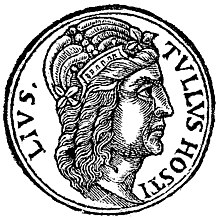| Tullus Hostilius | |
|---|---|
 Portrait from Promptuarium Iconum Insigniorum (1553) by Guillaume Rouillé | |
| King of Rome | |
| Reign | c. 672–640 BC |
| Predecessor | Numa Pompilius |
| Successor | Ancus Marcius |

Tullus Hostilius (Classical Latin: [ˈtʊlːʊs (h)ɔsˈtiːliʊs]; r. 672–640 BC) was the legendary third king of Rome. He succeeded Numa Pompilius and was succeeded by Ancus Marcius. Unlike his predecessor, Tullus was known as a warlike king who, according to the Roman historian Livy, believed the more peaceful nature of his predecessor had weakened Rome. It has been attested that he sought out war and was even more warlike than the first king of Rome, Romulus.[1] Accounts of the death of Tullus Hostilius vary. In the mythological version of events Livy describes, he had angered Jupiter who then killed him with a bolt of lightning.[2] Non-mythological sources on the other hand describe that he died of plague[3] after a rule of 32 years.[4]
Tullus Hostilius was the grandson of Hostus Hostilius, who had fought with Romulus and died during the Sabine invasion of Rome.[5] According to Plutarch, when Numa Pompilius died after a reign of forty-three years, his Pontifex Maximus Numa Marcius contended with Tullus Hostilius for the throne, but being defeated, he starved himself to death. Marcius's son, also named Numa Marcius, would serve as praefectus urbi under Tullus, and would be the father of Ancus Marcius, Tullus's successor.[6]
The principal feature of Tullus' reign was the defeat of Alba Longa. After Alba Longa was beaten (by the victory of three Roman champions over three Albans), Alba Longa became Rome's vassal state.
During his reign, Hostilius created the college of the Fetiales that concluded all treaties in the name of Rome.
- ^ "Titus Livius (Livy), The History of Rome, Book 1, chapter 22". www.perseus.tufts.edu. Retrieved 2020-12-12.
- ^ "Titus Livius (Livy), The History of Rome 1.31". www.perseus.tufts.edu. Retrieved 2020-12-12.; Plin. HN 1.54.140; Plut. Numa 22.7; Eutrop. 1.4; cf. Dion. Hal. 3.35.1-6; Sen. De Clem. 1.7.1
- ^ Penella, Robert J. (1990/05). "Vires/Robur/Opes and Ferocia in Livy's Account of Romulus and Tullus Hostillus". The Classical Quarterly. 40 (1): 207–213.
- ^ Livy, History of Rome, I
- ^ Livy, Ab urbe condita, 1:22
- ^ Plutarch. The Life of Numa. p. 21.